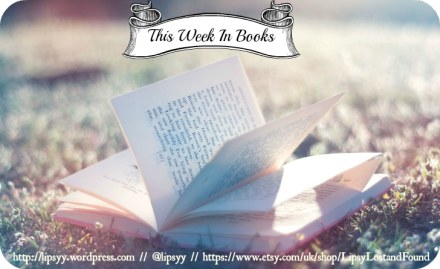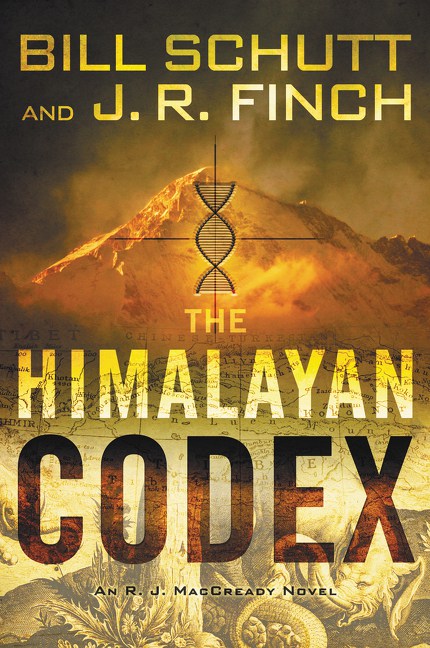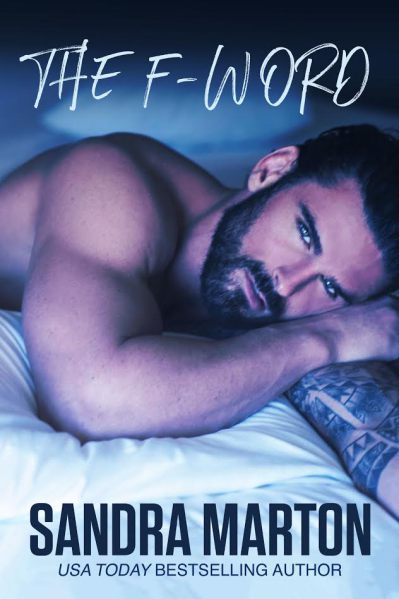 William Shakespeare’s STAR WARS seems to be written with a very specific audience in mind: one that both loves and knows the Star Wars movies (sci-fi nerds, myself included), as well as the works of Shakespeare (history and lit nerds). Which would seem to be a weirdly specific demographic, but in actual fact just goes to show how both Star Wars and Shakespeare can cross boundaries of genre and appeal to readers/viewers with all kinds of different tastes. Let’s face it, a lot of time it just isn’t helpful to make assumptions about what preferences for certain genres say about a person, because it’s almost always a lot more complicated than we’d like to think.
William Shakespeare’s STAR WARS seems to be written with a very specific audience in mind: one that both loves and knows the Star Wars movies (sci-fi nerds, myself included), as well as the works of Shakespeare (history and lit nerds). Which would seem to be a weirdly specific demographic, but in actual fact just goes to show how both Star Wars and Shakespeare can cross boundaries of genre and appeal to readers/viewers with all kinds of different tastes. Let’s face it, a lot of time it just isn’t helpful to make assumptions about what preferences for certain genres say about a person, because it’s almost always a lot more complicated than we’d like to think.
A mashup of Shakespeare, traditionally seen as the epitome of olde-worlde England (despite how often his plays are re-imagined in various contexts), and Star Wars, a seemingly futuristic story nevertheless set “a long time ago, in a galaxy far, far away” (or, as Doescher has it, “In time so long ago […] / In star-crossed galaxy far, far away” [Prologue]) would seem to be a weird combination. But as Doescher notes in his afterword, Star Wars‘ creator George Lucas was very aware of the archetype theory of fiction, the idea that stories tend to follow certain recognisable patterns that are familiar to their human tellers, and which are particularly visible in myth (for example, the hero on a quest, the journey from home, the defeat of the evil villain). The same, Doescher argues, goes for the plots of Shakespeare’s plots.
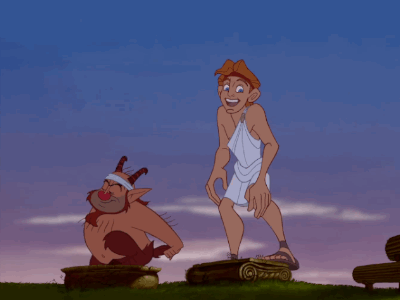
Exhibit A: The Hero. (Image Source)
Personally, I’m not a fan of the archetype theory of fiction – it strikes me as a little reductive and pointless, and the categories tend to be so vague that we can apply them to just about anything. While some people like that sort of thing, I sometimes wonder if trying to fit stories into certain categories doesn’t become a kind of self-fulfilling prophecy, and we all get super excited about it until we realise that it doesn’t really serve much of a purpose beyond convincing us that humanity is, when it comes to storytelling, remarkably uninspired.
But it’s undeniable that there is something that Shakespeare’s plays share with George Lucas’ films, namely a dramatic, theatrical quality that makes them incredibly compelling to watch. And this play draws on both to make a weirdly enjoyable text.

Kind of like that. (Image Source)
In some cases, this play adds to the experience of the original Star Wars movies. For instance, I’m sure we’ve all, on occasion, wondered what the lovable but incomprehensible robot R2-D2 is really thinking. Turns out, most of the time, what he’s thinking is, ‘Man, this C-3PIO guy’s a tool’. Except in iambic pentameter, of course.
And of course Doescher has fun with more than just Shakespeare and Star Wars. For a start, there are references to heaps of Shakespeare plays:
LUKE Friends, rebels, starfighters, lend me your ears.
(Act V Scene 4)
There are references that the Star Wars fandom can squee about to their heart’s content, my favourite being the following:
HAN [Aside:] And whether I shot first, I’ll ne’er confess!
(Act III, Scene 1)
And then there are, of course, references to other icons of pop culture:
HAN To march to the detention block’s unwise!
To make our way to danger folly ’tis!
To there present ourselves is passing mad!
To boldly go where none hath gone is wild!LUKE Hast thou no heart? She sentenc’d is to die!
HAN My sentence is: ’tis better she than I.
(Act IV, Scene 2)
(As you can see, Han Solo is just as cool when speaking in verse, which I’ve always assumed to be the case, and am very pleased to find affirmed.)
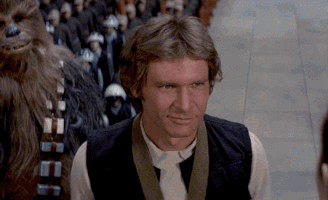
Despite the fact that he kind of doesn’t know how to wink properly. (Image Source)
Considering all the references to Shakespeare’s plays in this book, you might wonder whether this is really a way of retelling Star Wars through Shakespeare or of making Shakespeare accessible via Star Wars. Maybe it works both ways, I don’t know. The study guide that the publishers of William Shakespeare’s Star Wars provide seems to suggest that maybe it’s weighted a little more towards the latter. It’s still more important for kids to learn about Shakespeare, but now they can do it while talking about lightsabers and debating who would win in a fight between Jabba the Hutt and a Taunton.
On the one hand, this kind of mashup can be seen as a thought-provoking piece of pop culture. On the other hand, it can also be seen as rather a cheesy, gimmicky way to wring a few more bucks out of the vast, bloated bodies that are William Shakespeare and Star Wars respectively (as you can tell, I am entirely without William Shakespeare’s talent for subtle and well-written metaphor). But if you just want a fun read, or want to prove your geek credentials, then you can’t get much better than this. Forsooth.
Rating: 4 Stars

- More
